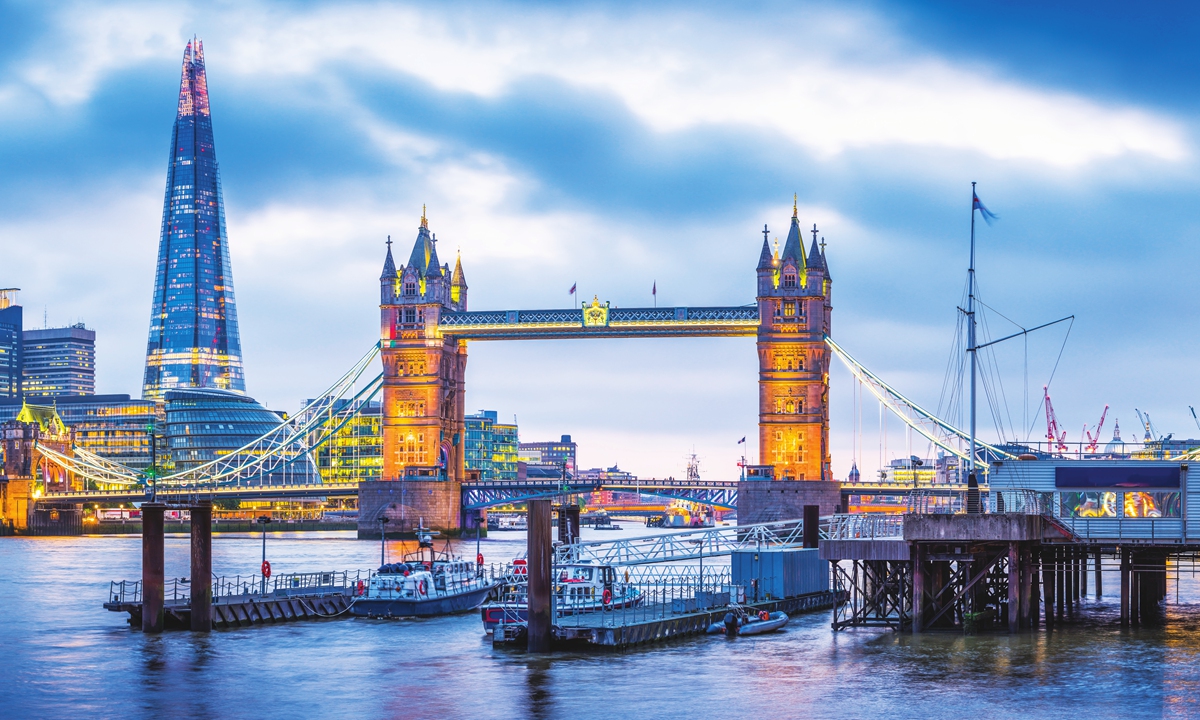China’s power in the world, economically and politically, a fact not going to change: former Corbyn adviser

Tower Bridge, London, the UK Photo:VCG
Editor's Note:For Chinese people, the past decade has been epic and inspirational. The country, under the leadership of the Communist Party of China (CPC) Central Committee with Comrade Xi Jinping at the core, has made great endeavors in boosting its economy, deepening reforms, improving the rights of its people and acting as a responsible global power.
After a "golden era," China-UK relations have dimmed significantly over the past few years, as London has chosen to follow Washington's steps closely and regard Beijing's development as a "threat" to its interests instead of a reciprocal partner. Why do some British politicians keep promoting a new cold war with China? Is there a misunderstanding in the UK about China's achievements? What could be the future of bilateral relations? Andrew Murray (Murray), a former communist, deputy president of London-based anti-war organization Stop the War Coalition, and former adviser to former Labour Party leader Jeremy Corbyn, shared his views on these issues with Global Times (GT) reporter Xia Wenxin.
This is the 19th article of the Global Times series about this special decade.
GT: You once claimed that "a cold war with China is against the interests of the British people." Are there many people who hold this view in British society today?
Murray: I believe quite a number. There has been an intense propaganda campaign against China in recent years. But nevertheless, there are a number of people in business who are aware of the damage a new cold war would cause; in the higher education sector, people who are concerned about community relations and community cohesion; and people that want peace in international relations.
I think there are a number of people who are aware that a cold war against China will not damage China so much as it will damage the interests of the British people.
I think it is important to emphasize that some people with the best intentions wished to oppose a cold war with China on the basis of a 100 percent defense of the Chinese government and the Chinese social system.
Those are important issues to discuss, of course. But in my view, the argument against a cold war with China will be, making it clear, that this will damage the interests of British businesses, workers employed in those businesses, the whole further and higher education sector, and the cultural sector. People may have very different views about the Chinese government or the Chinese social system, but that should not be a barrier to uniting them against a cold war.
GT: Why is this view rejected by some British politicians?
Murray: Some British politicians are simply swept along by the propaganda. I would think the main reason for the shift between the situation 10 years ago, when politicians were speaking of a "golden age" of Chinese-British relations, to the position today, is that most leading British politicians follow Washington. There is now, unfortunately, a sort of bipartisan position of hostility to China in Washington. If you look at British foreign policy over the last 70 years, it has been about, above all, following the US. I would say that is the main influence. Take Boris Johnson, now leaving as prime minister. He may have taken a more nuanced position toward China, but pressure from the Americans meant he had to fall into line with the anti-China campaign.
GT: Both Tory leadership candidates, Liz Truss and Rishi Sunak, have promised to take strong action against China after winning the election. In your opinion, will the future leader of the Conservative Party keep such a stance? Will the situation be different if the Labour Party comes to power?
Murray: It depends on what the tough actions actually are, but I would expect that the same fact as I've just mentioned will continue to prevail. It seems Liz Truss is most likely to win. She is already the foreign secretary, and she will continue to follow the American lead on this issue. I think that it's not realistic to hope for an improvement in China-UK relations in the near future.
As for the Labour Party, it is hard to say so now. We had the previous Labour Party leader Jeremy Corbyn who would have been realistic to look for an improvement. But Keir Starmer (current Labour Party leader) and his foreign affairs folk actually have been very hostile to China since they took office two and a half years ago.
In my view, there would not be a significant change. There might be some slight opportunities for amelioration. They might take a new look at some of the more challenging questions, but I wouldn't hold out great hope. As in the US, where Democrats and Republicans are not far apart on this question, I fear the same will be true here. The only factor that might make a difference is if there is a strong desire to confront Russia because of the war in Ukraine that might lead to a more pragmatic approach to China, simply to avoid having too many fights at one time.

Andrew Murray Photo: Courtesy of Murray
GT: You were a member of the Communist Party of Great Britain and the Communist Party of Britain. Is China's success under the leadership of the Communist Party of China (CPC) fully understood in British society?Murray: Many of the CPC's enormous achievements are generally neglected in the narrative in British society. I think that was based on a view that China would eventually become a sort of liberal, capitalist, bourgeois democracy. Now there is great anger that has not happened, and the CPC remains the leading force and develops plans for Chinese society on a scientific basis. So, I think the role of the CPC is not well understood. Partly it is seen as if it was merely the same as the Communist Party of the Soviet Union in years gone by, despite the many differences and the historical experience between the two countries.
GT: What has impressed you the most about China's achievements in the last decade? Do you have confidence in the future development of China?
Murray: I've only visited China once, but it was just on a short visit, [I am impressed by] the enormous scale of the economic development in the course of this century. The vast extent of urban and industrial development is almost overwhelming to see.
But what I personally think is important are the emphases that CPC has made in the last 10 years on trying to reduce social inequality, which had obviously widened considerably in the previous period of opening-up, and attempts to give stronger state's direction to the economy, not leave things simply to the market. Then, of course, the [China-proposed] Belt and Road Initiative has certainly represented the rise of China as a global economic power. I think those are the main features that have impressed me most.
I'm sure China will definitely carry on developing in the foreseeable future. The economic growth will not perhaps be at the rate it was 20 years ago, but that is normal - you can't grow at a rate of 10-12 percent a year forever. But I'm confident that China will continue to develop.
My hope is that its development will increasingly reveal the advantages of socialism. I hope having made this tremendous development will not let inequalities breed too far, or let private domination of the economy go beyond a certain limit. China does not seek to be a model for any other country. It says, we do what works for China, and other countries can learn as they please. But China increasingly reveals the advantages of socialist systems and societies.
GT: How do you think China-UK ties will develop in the future? Is it possible to restart the "golden era" of bilateral relations?
Murray: I don't think this will happen in the near future. Politically, there is a bipartisan negative view toward China. A great deal has been made around the recent episodes around the Taiwan island. And there is now a growing element in the British ruling circles that sees China's development as a "threat" to Britain's own positions in the world.
So, if we look at the near future, I can't see any basis for expecting an improvement.
Of course, the further ahead one looks, the more uncertain it becomes. China's power in the world, economically and politically, is now a fact that is not going to change. In the end, I believe the British establishment will have to come to terms with that and learn to live with that, even though they will always be issues of difference, including the different nature of our two societies and different values. I think there could be an improvement, but I wouldn't expect that in the near term.
GT: What changes are needed if London wants to repair its relations with Beijing?
Murray: I think respect for internal affairs and respect for differences are essential. If those things are accepted, then when particular issues of difficulty come up, they can be resolved in a moment or an even amicable way.
If we look at the issues that cause most controversy in relation to China, three of them - the position in Xinjiang with the Uygurs, the position in Hong Kong, and the position around Taiwan - are really internal affairs for the People's Republic of China. That must be respected, as we would expect China not to interfere in the matter of Scotland. Of course, one can have opinions on these things. One can even make criticisms if one wants. But they shouldn't interfere in state relations.
The only issue that is a sort of international issue is the question of the boundaries in the South China Sea, and that is a matter to be settled by the countries concerned and international organizations that should work to resolve those issues. So it's not really a direct concern of Britain.



